About
Crossing the White River 1--The Trestle
In the early 1870s, Enumclaw area residents had to cross the White River by horseback to reach Wilkeson for supplies and mail. James Johnson, who arrived in Boise in 1875, set up a cable ferry. It often capsized, and several people, including four mailmen, drowned making the dangerous crossing.
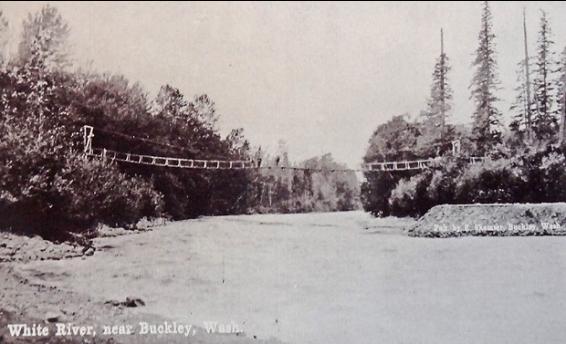
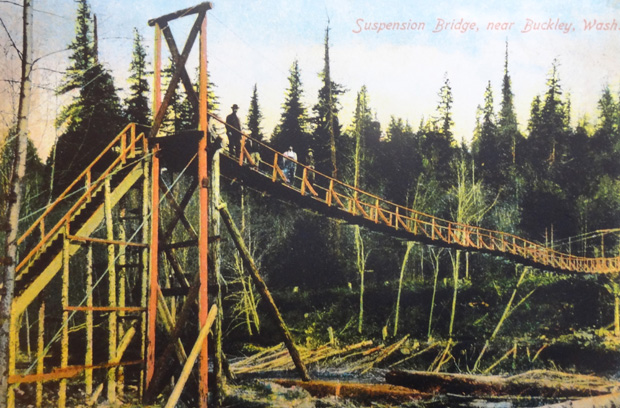
This picture from the Enumclaw side shows the trestle in 1887, soon after its construction. The highway and road bridge had not yet been built.
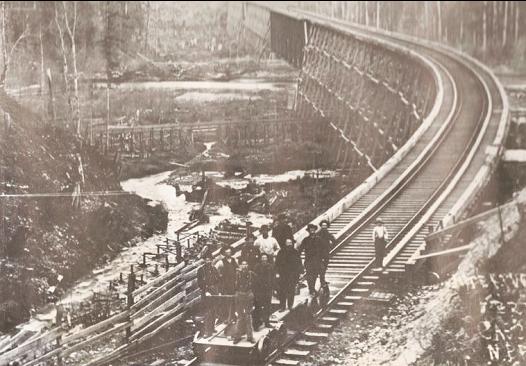
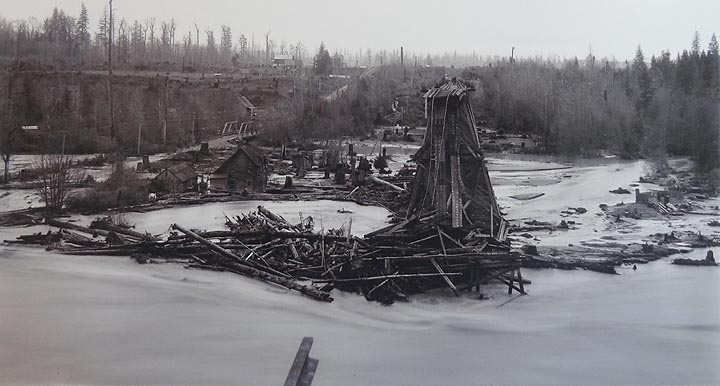
The trestle was rebuilt.
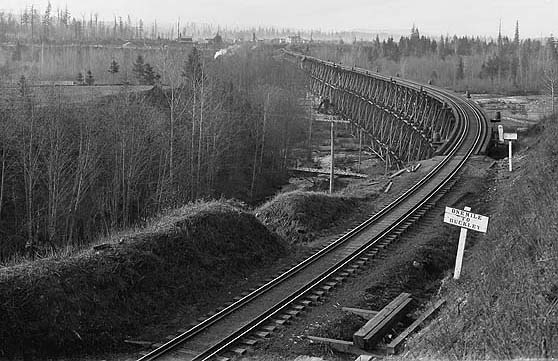
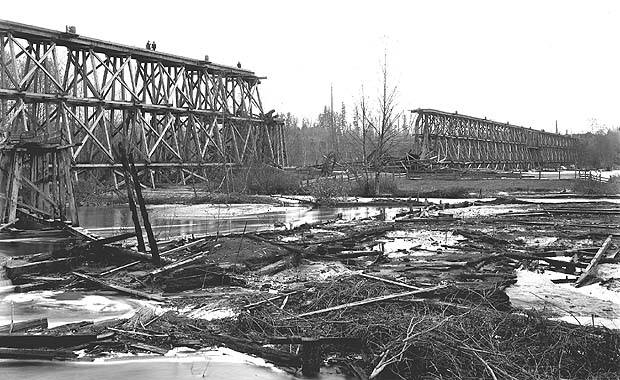
The White River Trestle was first built in 1887 and torn down 100 years later about 1987.
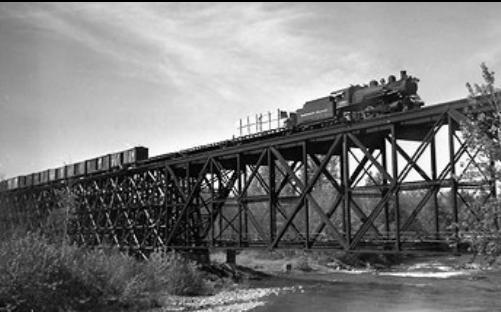
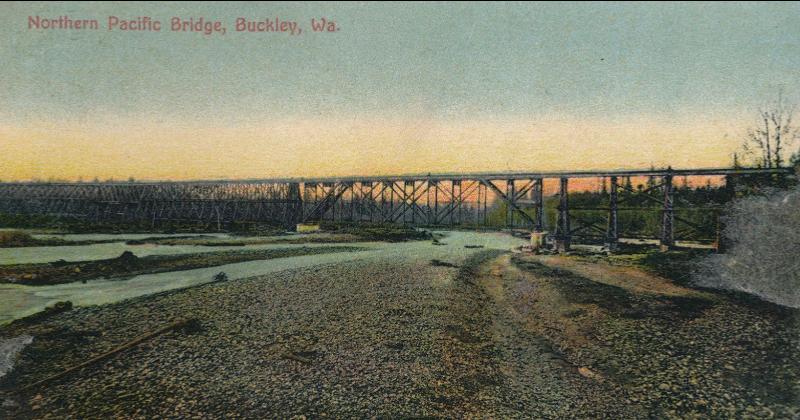
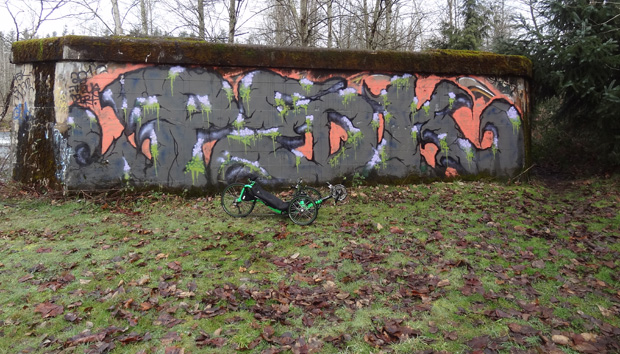
Drawings were completed for a half-mile long, 100 foot high trestle. By 1985, the tracks were in to Enumclaw and the right-of-way was being cleared from there to the river.
It looked like everything was set to run smoothly, but in 1891, two trains collided just before the bridge.
only to be destroyed again a few years later. It was rebuilt once more. The replacement rested on abutments sunk twenty-three feet into the subsoil. Those supports on both sides of the river are still in place today.
In a catastrophe without comic relief, the 1906 flood destroyed the trestle, and residents were forced to return to the ferry to cross the river.
"Early Thursday (May 22) morning as freight train 56 pulled out of town and swung round the curve on this side of the bridge, her engineer caught sight of another train clattering across the bridge.The air brakes were quickly turned on and the fireman and engineer jumped for their lives, the men on the other engine doing likewise, and the two engines slammed together and locked horns. Had theeastbound train been a few seconds ahead, the collision wold have occurred on the trestle, and the train men would have gone to sure destruction. As it was, no one was hurt.
"A car containing a lot of hogs was pitched to one side and badly smashed. A car containing forty-five barrels of wine was almost completely telescoped, and the wine flowed freely in every direction. The news of the occurence reached Buckley at an early hour. . . The debris was surrounded by a vast army of men and boys, most of whom were bunched immediately in front of the car which contained the liquor. A continual stream of mixed drinks trickled down the side of the car, and tin pans, old cans, and every kind of vessel that could be brought into requisition were rapidly filled and drained off, while many began to arrive with buckets and milk pans to obtain a supply to take to their homes. The scene was amusing and yet in many respects extremely disgusting. Boys and men, unable to a dirty old tin can, would hold their mouths under the drip and guzzle like hogs catching drips under a watering trough. A number of church members, noted for their piety took an active part in the exercises, and an effort was made by a photographer present to include them in a photograph of the scene, but not with much success, as they retreated until he changed his position.
"After a while the liquor began to tell upon a goodly number of bibulous citizens, and not unexpectedly a fight was started and a whole mob of staggering heroes engaged in a regular old-fashioned Irish set-to. The contrast at this stage of the proceedings between the quietly grunting hogs in one of the wrecked cars and the assembly of American intelligence rioting about the spilled liquor was decidedly in favor of the hogs. (Buckley Banner, May 23, 1891.)
"A car containing a lot of hogs was pitched to one side and badly smashed. A car containing forty-five barrels of wine was almost completely telescoped, and the wine flowed freely in every direction. The news of the occurence reached Buckley at an early hour. . . The debris was surrounded by a vast army of men and boys, most of whom were bunched immediately in front of the car which contained the liquor. A continual stream of mixed drinks trickled down the side of the car, and tin pans, old cans, and every kind of vessel that could be brought into requisition were rapidly filled and drained off, while many began to arrive with buckets and milk pans to obtain a supply to take to their homes. The scene was amusing and yet in many respects extremely disgusting. Boys and men, unable to a dirty old tin can, would hold their mouths under the drip and guzzle like hogs catching drips under a watering trough. A number of church members, noted for their piety took an active part in the exercises, and an effort was made by a photographer present to include them in a photograph of the scene, but not with much success, as they retreated until he changed his position.
"After a while the liquor began to tell upon a goodly number of bibulous citizens, and not unexpectedly a fight was started and a whole mob of staggering heroes engaged in a regular old-fashioned Irish set-to. The contrast at this stage of the proceedings between the quietly grunting hogs in one of the wrecked cars and the assembly of American intelligence rioting about the spilled liquor was decidedly in favor of the hogs. (Buckley Banner, May 23, 1891.)
On arriving at the river, which was to be crossed by boat, we found the boat and owner waiting for us, so it was not necessary to blow the cow's horn hanging on a nearby tree to bring them. Mrs. Stevenson's brother, Joe Fell, a boy of fourteen, asked my folks to let my brother and me cross with him on a twelve inch plank stretched across the river for the workmen preparing for the railroad bridge soon to be built. Just as we got to mid-stream, high above the water, and over the deepest and swiftest part, I suddenly seemed to see the water coming up to me and gave a short squeak. Joe shot out a hand to us, yelling to us to look up, look anywhere but at the water, which we did. Soon my eyes cleared again and I saw the boat a distance upstream from us with mother and the children in it.
Finally, a footbridge was built to span the unpredictable rapids.
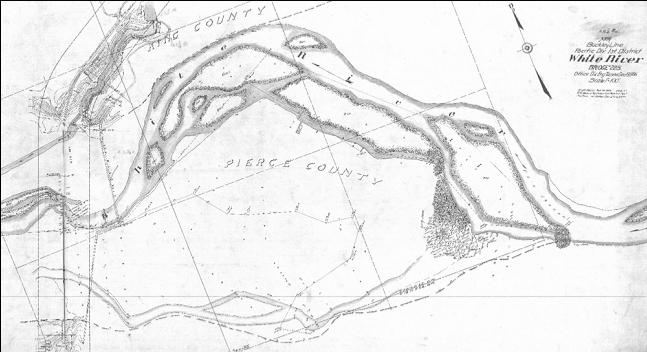
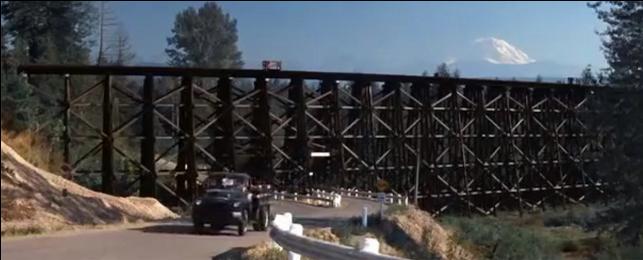
Rail service came to an end in Enumclaw in 1956, but the trestle had one last appearance in the limelight when Elvis rode under playing a ululele in the 1963 movie, It Happened at the World's Fair.